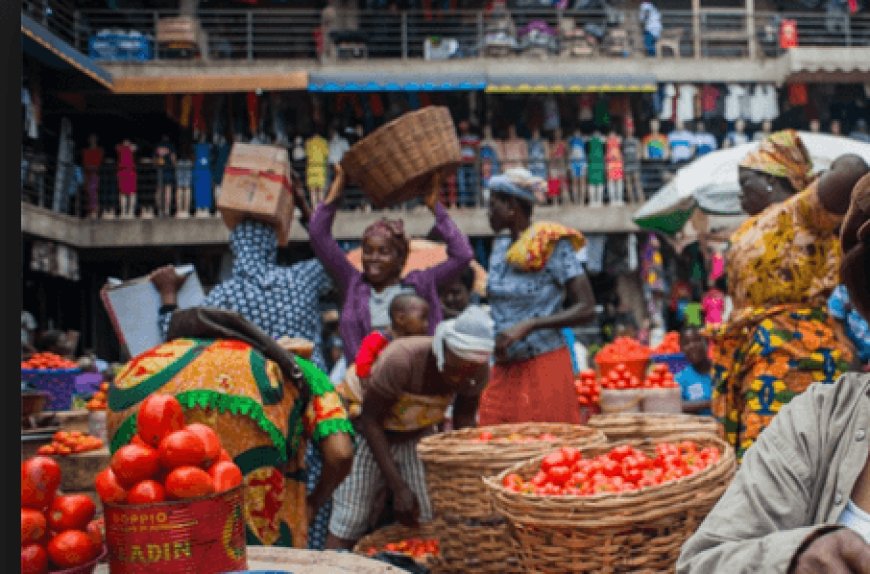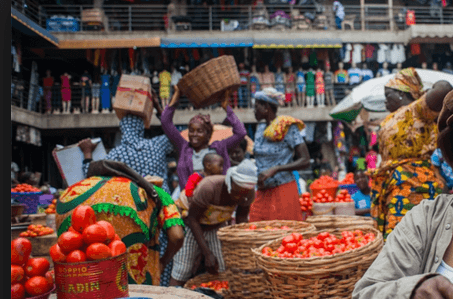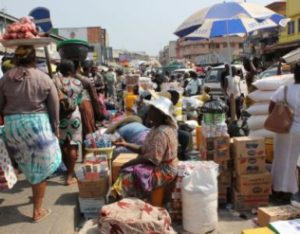Daily tax burdens of the market woman in Ghana
Standing behind Aunty Felicia and some women traders in the Sekondi market on that faithful Tuesday market day, you could share in their frustration on tax duties and its tolls on their daily financial growth. The post Daily tax burdens of the market woman in Ghana appeared first on Ghana Business News.


 Standing behind Aunty Felicia and some women traders in the Sekondi market on that faithful Tuesday market day, you could share in their frustration on tax duties and its tolls on their daily financial growth.
Standing behind Aunty Felicia and some women traders in the Sekondi market on that faithful Tuesday market day, you could share in their frustration on tax duties and its tolls on their daily financial growth.
Taxes
Taxes and market tolls have been a form of tax collection by the government and the Assemblies to ensure that basic infrastructure that made life comfortable to the citizens was always available.
The Sekondi market, now in its dilapidated and collapsing state, had been the centre of economic activities from time immemorial and for a beef seller, aunty Felicia and friends a home for bread for ages.
Some of the daily financial burden in the form of taxes and tolls included market toll, refuse, carriage, and storage rates and with its constant increment posing a huge financial burden to confront.
Scenario
Aunty Felicia is a popular trader at the Sekondi Market where most women usually shop on every market day for foodstuff.
She tells them “Petty, petty” taxes and rents on women in the market should be a worry to stakeholders to ensure fairness in the tax system.
She added, “we pay for everything services here when our taxes should make these services readily available to us…going to nature’s call, urinary, as women we are now paying huge taxes on sanitary pad for girls also”.
Taxation, and domestic resource mobilisation are the backbone in fostering sustainable development and reducing poverty.
Challenges
However, entrenched challenges such as gender imbalance in tax systems, impact of illicit financial flows (IFFs) on women and marginalized groups and gaps in Digital Rights Management (DRM) hinder progress towards achieving equitable outcomes.
It is in line with this real-life situation that the Network for Women Right in Ghana (NETRIGHT) in collaboration with Tax Justice Network Africa (TJNA) is implementing a three-year project titled Scaling Up Tax Justice III (SCUT III).
The project on the theme, Empowering Voices for Equitable Taxation: Building a Generation of Tax Justice Champions.
Economic cooperation
According to July 2023 report by Organisations for Economic Co-operation and Development (OECD), Africa loses a rate of $60 billion annually to illicit financial flows, (IFFs) as underlined by the African Development Bank Group.
Moreover, a 2015 report by the African Centre for Energy Policy (ACEP) revealed that Ghana extractive sector loses $702 billion annually due to IFFs, with ACEP reporting in 2022 that Africa loses around $40 billion to IFFs in extractive products alone.
While IFFs affect every country, their effect on developing nations, with their limited resources was particularly serious, these flows curb country’s ability to fund essential public services, thereby holding up economic and social development.
Domestic resource mobilisation
The Agenda 2063 approved that countries strengthen domestic resource mobilisation, build continental capital markets and financial institutions, and change IFFs for Africa to be self -reliant and finance its own development.
At a recent workshop to deepen the understanding on key concepts and issues relating to taxation, illicit financial flows and domestic resource mobilization for selected Journalists, Madam Patricia Blankson Akakpo, an officer from NETRIGHT said good investigative journalism skills and techniques could help uncover financial corruption, tax evasion and other illicit activities.
She encouraged the media to learn more about the types of taxes and their implications, key concepts and terminology related to taxation, reporting on the intersection of gender, taxation, and social justice issues.
Madam Akakpo said journalists ought to be ethical in their reportage on taxation and financial matters, acquire good investigative journalism techniques to uncover money laundering and corruption in the tax system.
Illicit financial flows
She said journalists ought to understand illicit financial flows (IFFs)and their impact on economy, common methods and techniques used for illicit financial activities, case studies and examples of IFFs context.
She mentioned that the role of the journalists was to advocate fair taxation policies, hold government and corporate institutions accountable for tax evasion.
They were also to highlight issues affecting marginalized communities through regressive tax policies.
She encouraged the journalists to work on developing story ideas and pitches related to taxation, IFFs and domestic resource mobilisation.
By Mildred Siabi-Mensah
Source: GNA
The post Daily tax burdens of the market woman in Ghana appeared first on Ghana Business News.















































